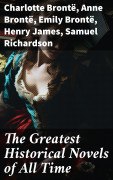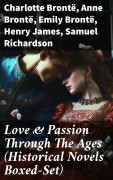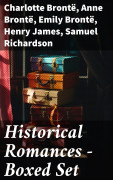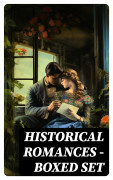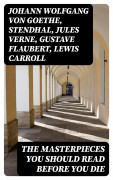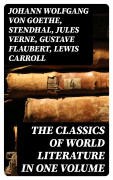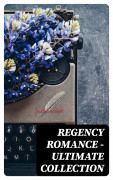Charlotte Brontë, Anne Brontë, Emily Brontë, Henry James, Samuel Richardson, Jane Austen, Guy de Maupassant, Thomas Hardy, Bernardin de Saint-Pierre, Edith Wharton, Maria Edgeworth, Henry Fielding, Anthony Trollope, Alexandre Dumas, Mary Wollstonecraft, Louis Hémon, Nathaniel Hawthorne, William Makepeace Thackeray, Grace Livingston Hill, Gilbert Parker, Fanny Fern, Georg Ebers, Fanny Burney, Mary Hays, Robert Williams Buchanan, Mary Angela Dickens, Madame de La Fayette, F. Scott Fitzgerald, D. K. Broster, Sabine Baring-Gould, Eliza Haywood, Leo Tolstoy, Catharine Trotter Cockburn, Lady Sydney Morgan, Pierre Choderlos de Laclos, Mrs. Olifant, María Ruiz de Burton, Lady Charlotte Bury, Philip Meadows Taylor: The Greatest Historical Novels of All Time
70 Novels in One Edition: Love Through the Ages – From Ancient Egypt to the Roaring 30s

| Produkttyp: | eBook-Download |
|---|---|
| Verlag: | DigiCat |
| Erschienen: | |
| Sprache: | Englisch |
| Seiten: | 22.636 (Druckfassung) |
| Format: | EPUB
Info▼
|
| Download: | 35,4 MB |
Dieses Produkt ist in Ihrem Land leider nicht zum Download verfügbar.
Laut Ihrer IP-Adresse sind Sie von Vereinigte Staaten aus online, wo uns lizenzrechtliche Gründe den Verkauf dieses Produkts leider nicht erlauben.
The Greatest Historical Novels of All Time presents an unprecedented collection that traverses the expansive terrains of historical fiction, weaving through the tapestries of different epochs and societies. This anthology encapsulates a rich mosaic of literary styles, from the pioneering gothic romances of the Brontë sisters to the intricate social tapestries of Jane Austen and the dramatic narratives of Alexandre Dumas. Each piece, carefully curated, not only stands as a monumental work in its own right but also contributes to a dialogue across centuries, offering insights into the complexities of human history and the enduring nature of certain themes—love, power, and the struggle for identity against the backdrop of historical events. The diversity within this collection speaks to the significance of historical novel writing as a mirror to humanity's past and a lens through which we can interpret our present. The contributing authors and editors of this anthology bring together a wide range of experiences, backgrounds, and perspectives, united by their mastery in capturing the essence of the human experience within specific historical contexts. The inclusion of figures such as Edith Wharton and F. Scott Fitzgerald alongside pioneers like Mary Wollstonecraft and Leo Tolstoy creates a dynamic exploration of societal norms, gender roles, and personal identity across different cultures and epochs. This anthology aligns with several critical literary movements, from Romanticism to Realism, offering readers a comprehensive understanding of the evolution of historical narrative and its role in shaping contemporary thought and literature. For scholars, students, and enthusiasts of historical fiction, The Greatest Historical Novels of All Time offers an unparalleled opportunity to engage with the works of some of literature's most esteemed writers. This anthology not only serves as an educational tool, offering insights into the constructs of historical narratives but also celebrates the breadth of human emotion and experience across time. Readers are invited to delve into this collection, to enjoy the vast landscapes of human history it presents, and to appreciate the dialogue it fosters between the different authors' works, each contributing a unique voice to the chorus that narrates our past.
